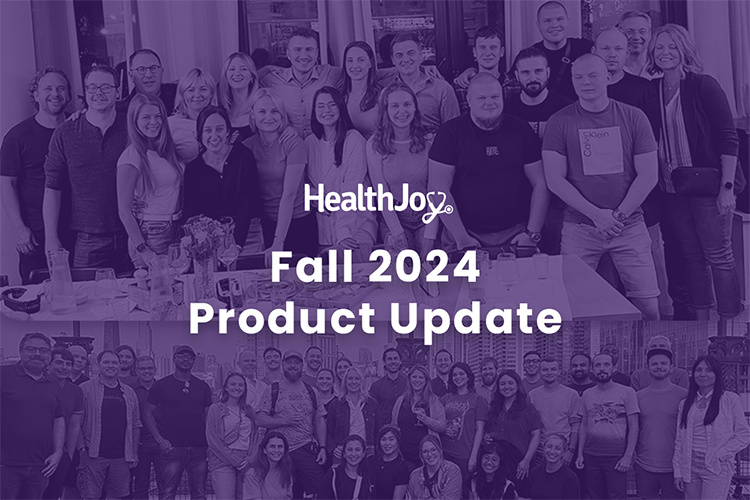HealthJoy's 2024 Fall Product Updates
As always, I’m excited to share some of HealthJoy’s latest product updates and enhancements, but I’m particularly excited about the timing of this...
Connected Navigation Platform
Guiding to high-value care
Behavioral Health
Foster a mentally healthy workplace
EAP
Supporting holistic wellbeing
Virtual MSK Care
Reimagining musculoskeletal care
Virtual Primary Care
Powered by smart navigation
Surgery Centers of Excellence
Best-in-class surgical outcomes
Virtual Urgent Care
Immediate care, any hour of the day
Chronic Care
A new approach to chronic care
Integrations
Flexible to any strategy
3 min read
 Claire Wiseman Imber
:
July 14, 2021
Claire Wiseman Imber
:
July 14, 2021
The pandemic upended the working world, and as we cross into the third quarter of 2021, employers continue to experience job shortages and hiring difficulties.
As individual companies reckon with their return to work policies, vaccine mandates, and newly remote workers, those workers are also carefully assessing their options. Company leaders are asking: How do we attract and retain top talent? How can remote work support new workers? And what salary, benefit, and workplace policies can help companies stand out?
To dive into these questions and get a pulse on how HR teams perceive this new landscape, we surveyed 334 HR professionals about their hiring challenges and plans for 2021.
Methodology: 334 HR professionals surveyed in July, 2021
Over the last year, we’ve firmly flipped the switch on remote work. A PwC survey found that 78% of CEOs agree remote collaboration is here to stay; our April Employee Benefits Insights Survey found remote work was the most desirable benefit among 57% of employees. Candidates have more options and are seeking change after a difficult year forced them to reckon with priorities. Our latest pulse survey found employers are struggling to hire in this new climate.
As applications drop and jobs remain unfilled, HR pros are concerned on two fronts: hiring and retention. Those fears aren’t unfounded. A March 2021 survey from Prudential Financial found that as many as 1 in 4 workers planned to look for a new job when the pandemic ended. Our pulse survey also found that anxiety around workforce staffing is palpable. Among our respondents:
In a buoyant job market, employers are pulling out all the stops to appeal to new talent. The leaders we surveyed are considering compensation changes first, followed by flexible remote policies to sweeten the deal. We learned:
Changes to in-person and remote work policies means companies must update onboarding, education, open enrollment, and employee engagement strategies to encompass hybrid and remote models. Strategies previously used for in-office employees, from open enrollment meetings to perks that drive engagement, don’t apply to the estimated 40+% of employees who will continue to work remotely after the pandemic. The employers we polled were split over their preparedness. Among our pulse survey respondents:
In many ways, 2021 has been a test run for the changes we’ll see play out in the new world of work. Those changes, coupled with workers’ desire for new challenges and opportunities, present unique challenges to HR teams tasked with recruiting and retaining employees. Anxiety among those HR teams was apparent in our survey, with over three-quarters of respondents saying they worry about hiring and retaining top talent. Applicants to open roles are down, and three-quarters of our survey respondents agreed that recruiting in 2021 is more difficult than in the previous year.
To move the needle and appeal to both in-house and prospective talent, companies are offering higher salaries. They’re also turning to flexible remote work policies; almost half of the respondents said they were offering flexible remote policies in order to attract new talent and retain employees.
With just over one-third of respondents saying they planned to add benefits in order to appeal to top talent, and less than one-fifth reporting planned changes in medical benefits, benefits may offer recruiters an opportunity to stand out. For context, in our April survey of 1,600 employees, 56% said they place greater emphasis on benefits due to the pandemic. About half reported they were happy with their benefits, and that benefits contributed to their job satisfaction.
The results of our survey make it clear that hiring is a top concern for employers in 2021. Hiring in the new world will require more from HR teams than ever before. The lasting effects of the COVID-19 pandemic demanded a new way of thinking long-term, and HR pros must be willing to show job seekers their ability and willingness to innovate and pivot to better align with employees’ priorities.


As always, I’m excited to share some of HealthJoy’s latest product updates and enhancements, but I’m particularly excited about the timing of this...

It’s no secret that telemedicine has emerged as a critical component of healthcare during the COVID-19 crisis.

I’m thrilled to announce the launch of the 2021 State of the Benefits Experience Report.